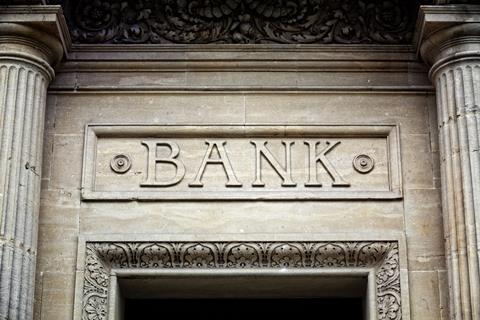Ahead of the likely longest downturn since the 1930s, Daniel Gayne asks construction experts for tips on how to ride out the hard times.
The construction sector may not have noticed it yet, but the country looks to be heading for a recession. It happened sometime around September, when the Bank of England implemented the biggest single interest rate rise since the fall of the Berlin Wall. That rate rise is widely expected (including by the Bank) to push the country into a recession that could last two or more years.
It is not all doom and gloom, though. The latest figures for construction output show that the sector remained surprisingly resilient to the broader economic malaise ŌĆō at least up to September ŌĆō and most of the industry leaders to whom ║├╔½Ž╚╔·TV spoke for this piece are not too alarmed by the BankŌĆÖs predictions.
Paul Ruddick, founder of prefab firm Reds10, says existing labour shortages could compensate for a drop in work ŌĆō ŌĆ£even if demand dips, there is still not enough people to do the workŌĆØ ŌĆō while Mike Hedges, director of Beard Construction, says the economic volatility of recent years means recession planning will have long been an agenda item at most firmsŌĆÖ board meetings.

The next few years will be a very different experience than the cliff-edge recession experienced after the global financial crisis in 2008. Rather than a complete collapse of demand, we are likely to see a longer period of high variable and fixed input costs along with suppressed output prices from increased competition and weaker relative demand.
ŌĆ£It sounds like a bizarre statement, but a cliff-edge recession is easier,ŌĆØ says Andy Reynolds, global chair of consultancy Rider Levett Bucknall. ŌĆ£ItŌĆÖs more catastrophic and in that sense ŌĆō it can force companies to make radical decisions to survive. The thing about this type of recession is the risk that companies donŌĆÖt spot the danger signs for their business early enough.ŌĆØ&▓į▓·▓§▒Ķ;
It is vital, then, that firms take a prudent approach to business if they want to survive the downturn in good shape.
DO Be flexible and ask what you can offer to more resilient sectors
A focus on core markets may be the instinctive response to a difficult period, but according to Allan Wilen, economics director at Glenigan, it is important to be imaginative to secure a strong pipeline of work. ŌĆ£From a company perspective in terms of their workload, it is going to be a challenging time [ŌĆ”] so youŌĆÖre going to have to be alert to the different opportunities that may be emerging,ŌĆØ he says.
ŌĆ£We are looking at economic headwinds, but there are going to be bright spots, but they may not be the sector that youŌĆÖve traditionally worked in or the companies youŌĆÖve traditionally worked with, or in parts of the country, thatŌĆÖs youŌĆÖre usually focused.ŌĆØ He notes that the London market remains under pressure, with more opportunities in the regions, while sectorally the industrial and logistics market look likely to be resilient.
The Construction Products AssociationŌĆÖs economics director, Noble Francis, agrees, noting that construction remains a ┬Ż170bn industry ŌĆō ŌĆ£so thereŌĆÖs still lots of work out thereŌĆØ.

Francis continues: ŌĆ£The key to weathering a slowdown is to focus on areas where activity will remain strong, even if it not in your usual area of work. Some of the other construction sectors will have niches which involve your area of work ŌĆō look at where the opportunities are and donŌĆÖt just stay in your usual sector and chase work, bidding low. That just exacerbates the situation especially with high and uncertain cost inflation.ŌĆØ
Scott Smyth, founder and chief executive officer of consultancy Soben, says the geographic and sectoral spread of his firmŌĆÖs work ŌĆ£naturally hedgesŌĆØ the business and explains how the firm plans to ŌĆ£dial upŌĆØ specific sectors that will be less depressed. He adds: ŌĆ£If you are looking ahead and you think that the sector you are in is going to be at risk, are there services that you can provide? Are there sectors that you can perhaps pivot into that are more buoyant?ŌĆØ&▓į▓·▓§▒Ķ;
DONŌĆÖT Take work you cannot deliver to keep up revenue
Smyth advises maintaining a ŌĆ£laser focusŌĆØ on your bank balance and cash flow. ŌĆ£Check payment terms with your clients and work with them to ensure you are paid according to terms,ŌĆØ he says.
ŌĆ£Have your finance team seek agreement from the client early that the invoice is approved and on the system for payment.ŌĆØ He also advises keeping enough cash to cover at least three months of your fixed cost outgoings.
Sometimes you are better just stand still [ŌĆ”] downsize a little bit and ride it out
Paul Ruddick, Reds10
It is also important to remember that project viability can change quickly. ŌĆ£Project viability shifts as market shifts [ŌĆ”] sometimes projects which you think you had won might go on hold and therefore you need to plan for that,ŌĆØ says Reynolds, advising that firms work with clients to ensure jobs remain viable.
Maintaining a diverse portfolio of projects will therefore be important, to avoid putting too many eggs in one basket ŌĆō but that is not to say firms should overstretch chasing revenue. ŌĆ£DonŌĆÖt get into contract where you know you are going to lose money just to keep overhead costs,ŌĆØ says Ruddick of Reds10.
ŌĆ£Sometimes you are better to just stand still and say, ŌĆśyou know what, we might just have to downsize a little bit and ride it outŌĆÖ.ŌĆØ&▓į▓·▓§▒Ķ;
Simon Gorski, managing director in Europe for construction at Lendlease, agrees it is ŌĆ£best to be honestŌĆØ with clients about what can and canŌĆÖt be done. ŌĆ£Revenue is vanity, profit is sanity,ŌĆØ he says.
ŌĆ£If that means you have to be a little bit smaller for a period of time, I think thatŌĆÖs better than trying to maintain a business plan no matter what the economic conditions are.ŌĆØ
DO Focus on demonstrating your value to trusted partners
Taking a ŌĆ£conservativeŌĆØ and ŌĆ£prudentŌĆØ approach to accounting can also help to maintain a good relationship with supply chain partners, according to Hedges. ŌĆ£What that financial security allows us to do is to be really good payers [ŌĆ”] what that leads to is a bit of security among our supply chain and a level of service that [means] when things get tough [ŌĆ”] we are able to rely on that,ŌĆØ he says.
Focusing on your relationship with trusted partners will be vital on the client side too. Francis says sub-contractors should focus on work with main contractors or housebuilders they trust as ŌĆ£good, consistent work that you will get paid on time forŌĆØ is better in a downturn than larger quantities of unreliable income. ŌĆ£You donŌĆÖt want to be in the position of having them come to you pushing out payment times or with them starting to keep more of the retentions,ŌĆØ he says.
>>See also: Top 150 Consultants 2022: with the economic heat rising, will things halt again?
Smyth says: ŌĆ£Position yourself as a trusted partner with your client or customer, rather than being seen as a straightforward vendor [ŌĆ”] if you are truly a trusted partner of your client, then they will recognise the need to pay on time during periods of uncertainty.ŌĆØ
Ruddick agrees that your best clients will ŌĆ£want to see you get throughŌĆØ difficult times.
In periods of uncertainty it is important to be decisive and protect the business
Scott Smyth, Soben
Demonstrating value to good clients may be even more important for small contractors working in a difficult market, according to Francis. For residential repair, maintenance and improvements firms, aiming at the part of the market where homeowners are willing to pay to make sure the job is done well and on time is the way forward.
ŌĆ£Good small contractors are hard to find and trust is a key issue for many homeowners,ŌĆØ he says.
DONŌĆÖT Allow blind optimism to cloud your business judgement
If things take a turn for the worse, it is important to be prepared.
Smyth advises having a detailed and realistic plan to implement if turnover drops below a certain level. ŌĆ£As business owners, we tend to be optimistic all the time, but I think in periods of uncertainty it is important to be decisive and protect the business if youŌĆÖre facing some really serious economic challenges,ŌĆØ he says.
Smyth worked for contractor R&D Construction when it collapsed in 2011 on the back of the financial crisis and reflects that there was ŌĆ£an element of indecision and ŌĆśdonŌĆÖt worry, we have had a bad month, but this isnŌĆÖt going to last ŌĆō next month we will be OKŌĆÖ ŌĆØ.
He says this experience has made him sensitive to the need for hard realism in business planning and adds that it is crucial to keep open communication with staff about company strategy during such a crisis.


























1 Readers' comment